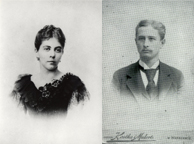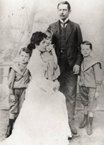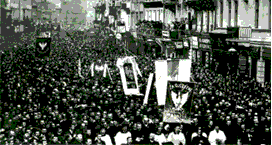|
“… but at times I am seized by a longing for you […], my sacred childhood!”“… but at times I am seized by a longing for you […], my sacred childhood!”
The Memoirs of Stefan Czarniecki in Bacacay [Trans. Johnston]
|

August 4: Birth of Witold Marian Gombrowicz on his father’s property in Małoszyce, 200 kilometers south of Warsaw, near Sandomierz. August 4: Birth of Witold Marian Gombrowicz on his father’s property in Małoszyce, 200 kilometers south of Warsaw, near Sandomierz. His father, Jan Onufry Gombrowicz (1868-1933), is of Lithuanian origin.
|
“My father? Handsome, tall, distinguished, very proper, punctual, methodical, not very broad-minded or artistic, a practising Catholic, but no bigot.”
A Kind of Testament: Interviews with Dominique de Roux [Trans. Hamilton]
|

His mother Antonina Gombrowicz, née Kotkowska (1872-1959), is the daughter of Polish landowners from Central Poland.
|
“My mother, on the other hand, was distinguished by an uncommonly lively nature and a fertile imagination. She was nervous, extravagant, inconsistent; she had no self-control. She was naive and, worst of all, had the most mistaken image of herself.”
Polish Memories [Trans. Johnston]
|
Jan Onufry Gombrowicz administered part of his in-laws’ estate, but also worked in manufacturing. He also started a paper mill and named it “Witulin” after his youngest son, who was to inherit it.

|
“So, in that Proustian epoch at the beginning of the century, we were a displaced family whose social status was far from clear, living between Lithuania and the former Congress Kingdom of Poland, between land and industry, between what is known as ’good society’ and another, more middle-class society. These were the first ’betweens,’ which absolutely multiplied until they almost constituted my country of residence, my true home.”
A Kind of Testament: Interviews with Dominique de Roux [Trans. Hamilton]
|

|
“… Despite appearances to the contrary, my family home was one immense dissonance constantly rending my child’s ear. There were many reasons for this state of affairs; one of the most important was the incompatibility in temperament and character between my mother and my father.”Polish Memories [Trans. Johnston]
|
Witold has two older brothers, Janusz (1894-1968) and Jerzy (1895-1971), as well as a sister, Irena, always called Rena (1899-1961). Witold has two older brothers, Janusz (1894-1968) and Jerzy (1895-1971), as well as a sister, Irena, always called Rena (1899-1961). Gombrowicz is raised Catholic by French and Swiss governesses: Miss Jeannette and Miss Zwieck.

|
“I was indeed a milksop from a so-called ‘respectable’ family, but here the word ‘respectable’ should be used without irony, since it was a home of people who generally speaking were kind-hearted and had their principles.”
Polish Memories [Trans. Johnston]
|

In the summer, Witold Gombrowicz’s family leaves Małoszyce for Bodzechów, located in the same region, and the estate of his maternal grandfather, Kotkowski. These new surroundings will later serve as inspiration for the setting of Witold Gombrowicz’s novels Possessed and Pornografia.

Accused of belonging to the revolutionary faction of the Polish Socialist Party, Gombrowicz’s father, Jan Onufry, is arrested and sentenced to two years of imprisonment—but manages to remain a free man.
|
“Here’s a scene that often comes back to me: a farm-hand in a pea-jacket, his head bare under the rain, talking to my brother Janusz, wearing a coat and sheltered under an umbrella. The hardness of the farm hand’s eyes, his cheeks, his mouth, in the pouring rain… Beauty…”
—A Kind of Testament: Interviews with Dominique de Roux [Trans. Hamilton]
|
1910
Witold Gombrowicz begins studying under tutors. His French and Swiss German governesses also teach him their languages.
|
“What fun it was! Those games permitted us to forget deeper and more dramatic irritations that lay hidden beneath the surface, and made it easier to deal with our mother. It was probably from here that there emerged in my later work the cult of play and an understanding of its colossal significance in culture.”
—Polish Memories [Trans. Johnston]
|

|
“The war that my older brothers and I waged on my mother primarily involved a systematic refutation of anything she said. It was enough that my mother should casually mention it was raining, for an overwhelming force to impel me immediately to declare with studied astonishment, as if I had just heard the most absurd thing: ‘What do you mean! The sun’s shining brightly!’”
—Polish Memories [Trans. Johnston]
|

|
“…in those Proustian days, there was a quantity of servants, the French governess looked after the children and my mother simply gave orders to the cook, the maid, or the gardener. But that didn’t stop her saying that she had ’the whole household on her hands,’ that work was ’ennobling,’ that ’the garden at Małoszyce is all my own work,’ and ‘fortunately I have a practical mind.’” “‘In my spare moments I like to read Spencer and Fichte,’ she would say in all sincerity, although the words of these philosophers occupied the lower shelves of the library, their uncut pages gleaming.”
—A Kind of Testament: Interviews with Dominique de Roux [Trans. Hamilton]Youth, Warsaw (1911-1928)
|





